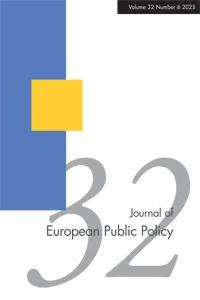Dans la même rubrique
- CEVIPOL
- FR
- Publications
- Articles
- Publiés en 2025
-
Partager cette page
The asymmetry of EU socio-economic governance: theoretical fault lines and constructivist avenues for future research
By Amandine Crespy
ÉDITION
Taylor & Francis
COLLECTION
Journal of European Public Policy
LIEN

Abstract
This contribution provides an analysis of scholarly disagreements over Fritz Scharpf’s thesis positing a pro-market bias of EU socio-economic governance. It first identifies three theoretical fault lines in the debate pertaining to (a) the meta-theoretical debate pitching legal-institutional structures against political agency in EU policy making; (b) the effectiveness of positive integration in addressing the ills of negative integration; (c) the (re)conceptualisation of the EU polity. For each of these, it then proposes avenues for future research to enlighten these dark matters from a constructivist perspective. How can we study the intrinsic contingency of politics, e.g., the construal of time or the ‘political work’ performed by agents which may lead to positive integration despite institutional constraints? How can we reconceive the role of the EU, moving beyond the idea that it should take the form of a supranational social market economy? All in all, it is argued that the institutional drivers of negative integration are ultimately politically constructed. Arguably, they powerfully shaped political agency in an era when the politics of EU integration were dominated by ordoliberal ideas promoting market making. Whether we will be witnessing the fading of this vision, or its enduring resilience remains an open question.
Mis à jour le 16 juin 2025
